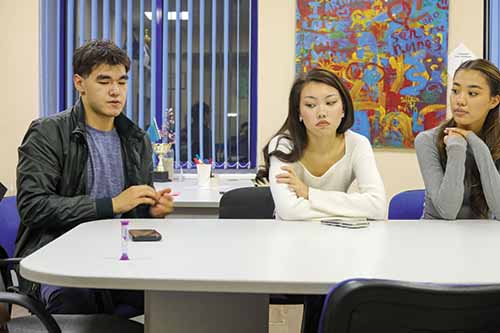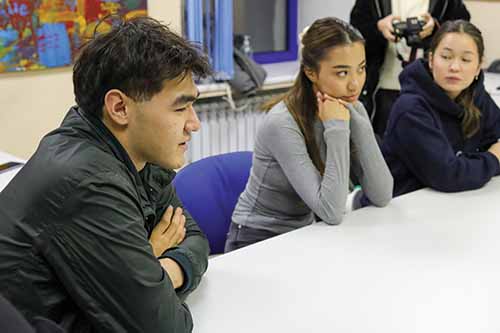The student government plans to renovate campus buildings, change the attendance policy, develop stronger community engagement, and update the constitution in the upcoming Spring semester.
“ We are going to meet Dr. (Chang Young) Bang and discuss these things soon,” said Amirzhan Yessenov, student government president. “We could not discuss everything on our first meeting in November as it would not be very diplomatic, we had just come to the cabinet by that time.”
Infrastructure Development
The student government endorsed the reconstruction of the dormitory building in the November meeting with Dr. Bang. According to KIMEP officials, the dormitory will be completed in two years. In the meantime, the cabinet plans to suggest a library renovation to meet modern university standards.
“The current state of the library does not reflect the prestige of a top institution,” Yessenov said. “There are no conditions to study — tables are set very low while chairs are high.”

Attendance Policy Revisions
In response to concerns about health and attendance, the student government wants to revise attendance policies to better reflect the realities of student life in Almaty. Recognizing challenges such as poor air quality and extended recovery times, they plan to increase the allowable absence threshold from 20% to 40%.
“I can say it from my personal experience. In Astana, it took me three-four days to recover from the flu. Now, I get sick for one or one and half a week at a minimum,” Yessenov said. Student government will propose the new policy to Vice President of Academic Affairs Dr. Damian Riviez.
The cabinet wants to consider some emergencies to be not counted as well such as funerals. The proposed changes aim to balance both the disciplinary and educational motivations of students.
“If you have 30% of absence, you only think about dropping the course,” said Yessenov. “Twenty percent is three weeks of sickness. Three weeks during the four-month semester is nothing.”
The vice president of academic affairs did not respond to an email asking for how the university might respond to the attendance policy proposal. The KIMEP Voice also attempted to stop by his office but Riviez was not available.
Special Events
The student cabinet plans to hold a town hall meeting to let students voice their concerns and interact with the student body directly, approximately on Jan. 31. On the same day, the North Korea Studies Association is visiting the university. From Feb. 5 to 11, KIMEP will host an event featuring the Federation of International Business Organizations.
The tender committee also approved major student organizations’ events.
“SOI, Miss KIMEP, Night Ice Skating, as always,” said Dana Zhamalbek, the CSS-2 deputy.
“Many new interesting and unusual events have been approved as well this time,” said Binura Tolepbergenova, the BCB-2 deputy.
The frequent reason for rejections at the Tender Hearings is poor preparation of student organizations such as the inability to answer the committee’s questions about when and where the event would take place.
“We understand that organizations had to prepare everything in a limited time,” Yessenov said. “That’s why we told them that we would judge them proportionally to the given conditions.”
The student government cannot reveal the total budget for clubs’ events this semester until the Additional Budget Hearings. The hearings were supposed to take place Jan. 25.
“This information is confidential and can be opened up only after the Additional Hearings. We want students to know finalized information to avoid confusion and misunderstanding,” said Yernar Zhakashev, student government vice-president of finance.
Improved Constitution
The cabinet also prioritizes smoother transitions between outgoing and incoming cabinets. By accelerating the inauguration process, it aims to allow former leaders to focus on post-university life while enabling new representatives to integrate more effectively.
“The student government is going to operate in a fast-paced mode due to late elections processes to ensure the plans are realized,” said Yessenov.

